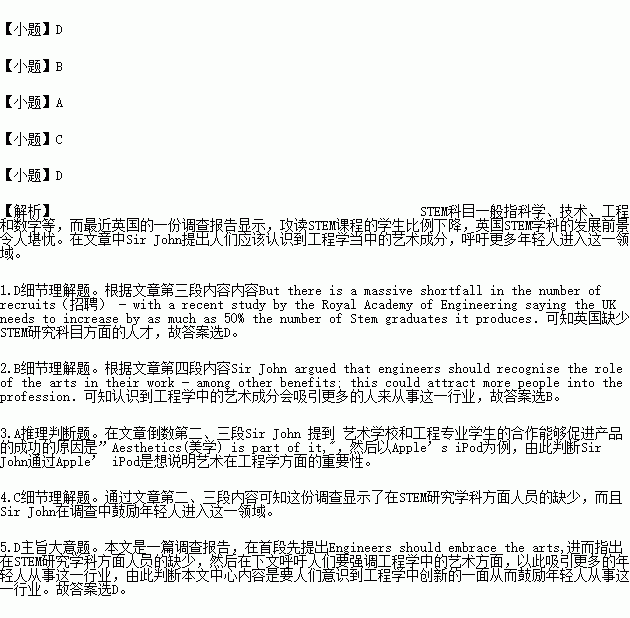题目内容
Engineers should embrace(接受) the arts,Sir John O'Reilly,a fellow of the Institution of Engineering and Technology,argued in a lecture.
About 59% of engineering companies in the IET's 2014 survey feared skill shortages could threaten(威胁) business.
"There is nothing as creative as engineering," Sir John told the reporter.He says science,technology,engineering and mathematics - often known as "Stem" subjects,are vital for a modern knowledge economy.But there is a massive shortfall in the number of recruits(招聘) - with a recent study by the Royal Academy of Engineering saying the UK needs to increase by as much as 50% the number of Stem graduates it produces.
Delivering this year's Mountbatten Lecture at the Royal Institution,Sir John argued that engineers should recognise the role of the arts in their work - among other benefits; this could attract more people into the profession.The lecture,Full Steam Ahead for Growth,advocated a wider adoption -- Steam,or science,technology,engineering,arts and maths.Engineers should embrace the arts as being key to creativity and an important component of innovation(创新),crucial to creating new products and boosting future competitiveness,he argued. "Engineering and technology is an increasingly diverse and creative field," said Sir John.
Some university engineering departments already cooperated with art schools to develop understanding,he told the reporter.In particular he mentioned Cranfield University's Centre for Creative Competitive Design and Imperial College's work with the Royal College of Art.The two sets of people could work well together and more emphasis on the creative side of engineering could improve the success of products,he said.
"Aesthetics(美学) is part of it," he told the reporter,adding that Apple's iPod was not the first digital media player,nor the only one that worked - but it came to dominate the market "because it was nice to have".
Sir John said he was not suggesting universities started requiring A-level art from engineering applicants - the key subjects for admission would continue to be maths and the sciences.But an emphasis on creative skills would help "broaden the pool and attract more people in".
1.According to a recent study by the Royal Academy _______ .
A. skill shortages could threaten business
B. engineering graduates are not as creative as expected
C. there are not enough arts graduates produced in the UK.
D. the UK needs more graduates in science,technology,engineering and mathematics
2.According to the lecture Full Steam Ahead for Growth,_______ .
A. engineers should cooperate with arts majors
B. Accepting the arts could attract more people into engineering
C. engineers should realize arts play the most important part in their work
D. engineering and technology is as diverse and creative as before
3.By giving the example of Apple's iPod,Sir John intends to _______ .
A. stress the importance of arts
B. stress the importance of marketing
C. stress the importance of communication
D. stress the importance of science and technology
4.Which of the following is true according to the passage?
A. More university students should study arts instead of engineering.
B. Engineering and technology is increasingly different and unrelated fields.
C. The IET's skills survey raised concerns about the number of recruits to engineering.
D. Students from some university engineering departments have already transferred to art schools
5.What is the passage mainly about?
A. Lack of creativity makes it difficult for the engineering major to find a satisfactory job.
B. The key subjects for engineering majors remain to be maths and the sciences rather than arts.
C. University engineering departments should cooperate with art schools to improve the success of products.
D. Engineering needs to emphasize its creative side to encourage more young people to choose it as a career.
 天天向上一本好卷系列答案
天天向上一本好卷系列答案 小学生10分钟应用题系列答案
小学生10分钟应用题系列答案
